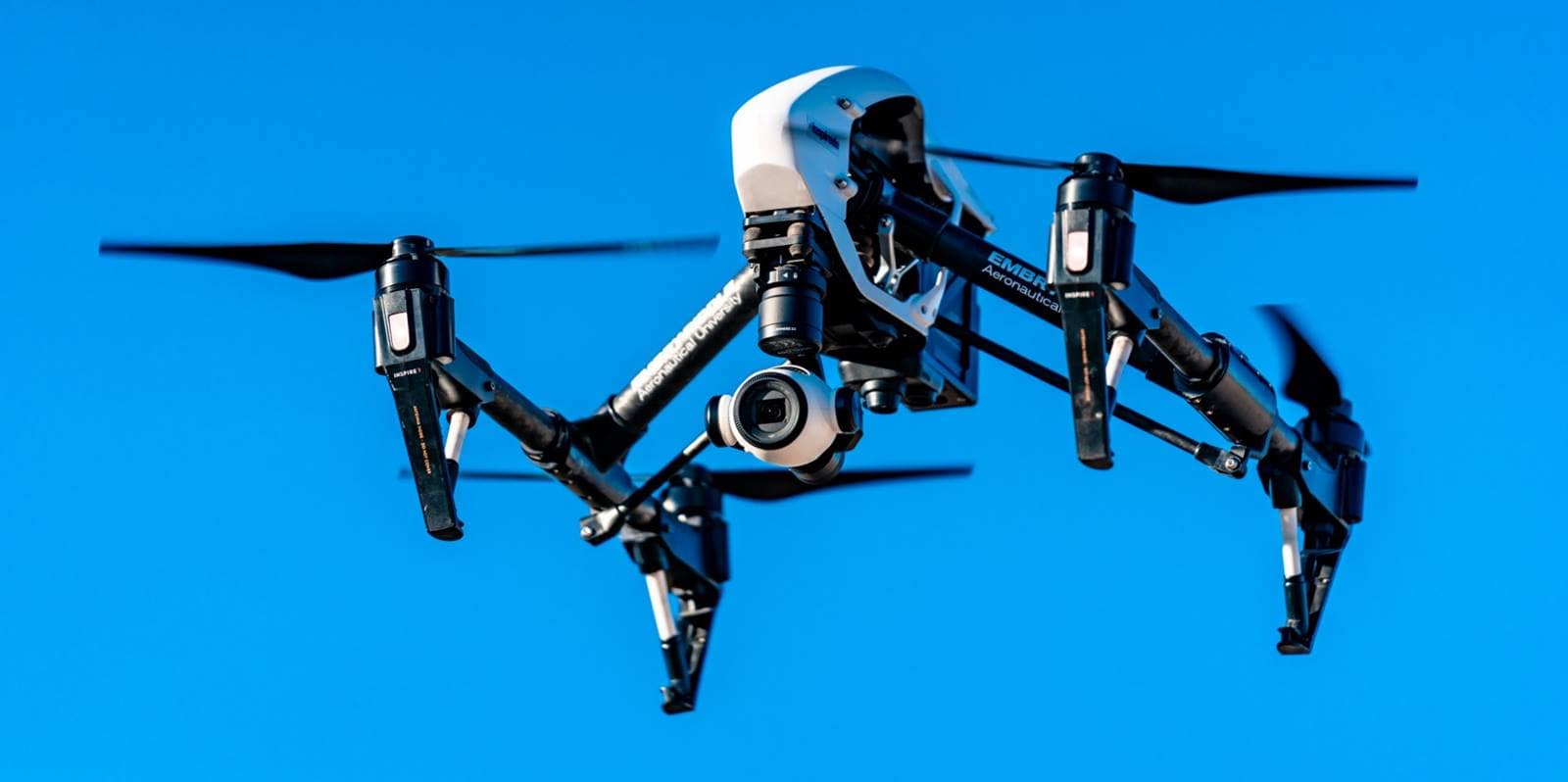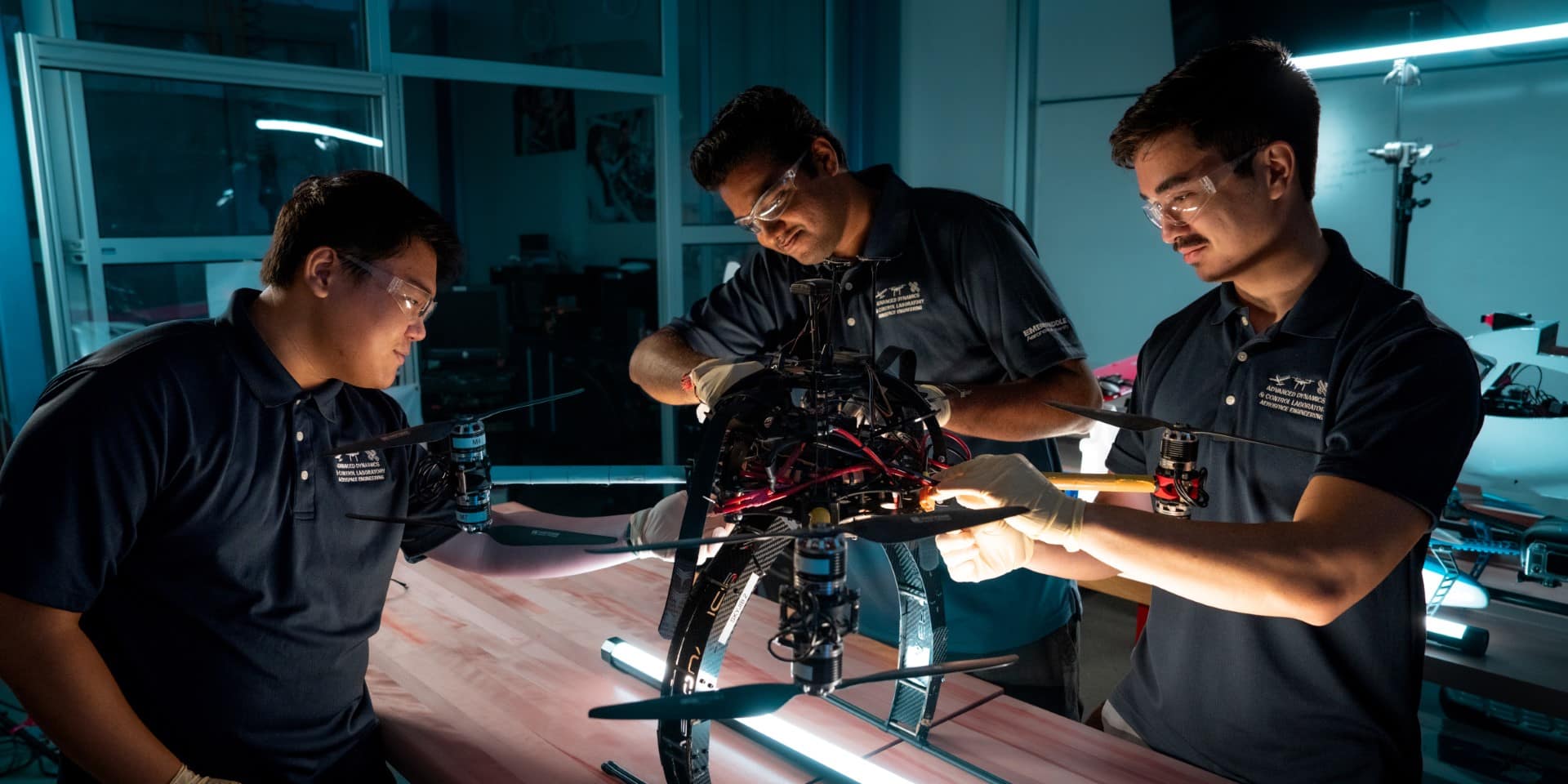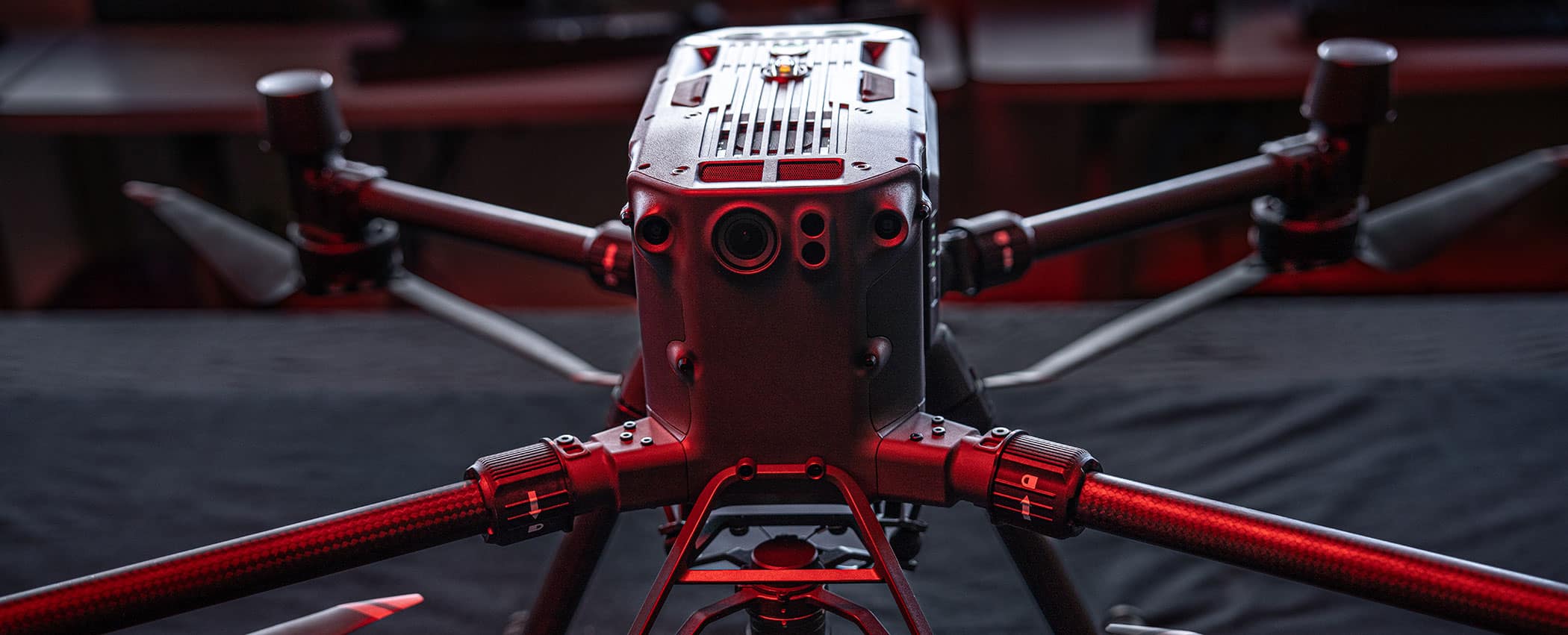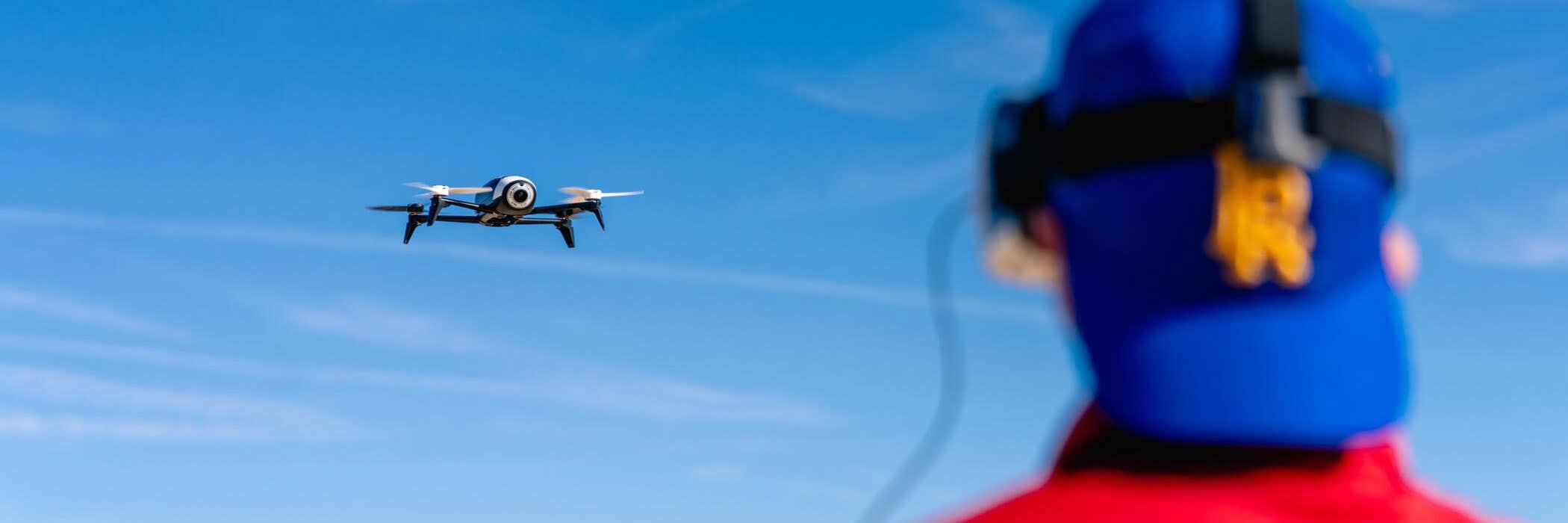
Bachelor of Science in
Uncrewed & Autonomous Systems
Embry-Riddle's Bachelor of Science in Uncrewed & Autonomous Systems equips students with skills necessary for flying drones and handling autonomous robotics.
About the Bachelor of Science in Uncrewed & Autonomous Systems
Embry-Riddle prepares students for work with UAS (Uncrewed Aircraft Systems) and sUAS (Small Uncrewed Aircraft Systems). This groundbreaking program prepares students for administrative, operations and development work with uncrewed aircraft systems in a range of industries — one of the first degrees of its kind that can be completed entirely online.
Putting an emphasis on the air domain, the program also covers drone and autonomous robotics in the space, ground and maritime domains. With continually updated curriculum firmly focused on the evolution of drones and autonomous robotics, students will learn how uncrewed aircraft systems are being deployed — and that we have only just begun to explore the full potential of the uncrewed systems technology.
Student Learning Outcomes
The Uncrewed & Autonomous Systems degree offers courses that examine major challenges found when dealing with uncrewed systems technology such as:
- Interoperability and Autonomous Robotics
- Airspace Integration and other domain integration
- Education and Training
- Propulsion and Power
- Teaming and Regulation
Uncrewed & Autonomous Systems Career Opportunities
Careers and Employers
The Bachelor of Science in Uncrewed & Autonomous Systems at Embry-Riddle Worldwide offers graduates career opportunities that go far beyond engineering and development, with a post-graduation placement rate of 83%. Graduates will be prepared to support, develop and apply the advanced technologies necessary when working for companies such as DroneSeed, DroneUp and the US Navy.
Uncrewed & Autonomous Systems Salary Information
The demand for those in the industry of drones and autonomous robotics is growing each day. Earning your degree from Embry-Riddle provides the opportunity for competitive salaries, with alumni averaging $90,000 annually.
DETAILS
About Uncrewed & Autonomous Systems at the Worldwide & Online Campus
Worldwide graduates will be prepared to support, develop and apply the advanced technologies necessary to support the growing and dynamic needs of the industry. They will also be qualified to help guide the policies and regulations that govern this emerging field.
Once the domain of military and government agencies, UAS and sUAS have entered the civilian and commercial sectors. From robotic vehicles roaming our streets to drones soaring through our skies, leading technology companies, news outlets, sports franchises and commercial enterprises all over the world increasingly rely on uncrewed systems technology for their operations.
Tracks/Specialties and/or Certificates
Students can customize the program to fit their desired career path by selecting specialized focuses on different aspects of uncrewed aircraft systems.
- Can obtain a Federal Aviation Administration (FAA) Part 107
- Residency Program UNSY 435 —an elite program to train professional drone pilots to the highest industry standards.
- The program schedules the residency over a weekend, twice each year – once in December and once in May – travel is required as it is hosted in Daytona Beach, Florida, at the Worldwide Headquarters.
- For students who choose to pursue their master’s degree, a 4+1 degree option is available.
Uncrewed & Autonomous Systems Information
The Bachelor of Science in Uncrewed & Autonomous Systems focuses on the growth, innovative development and effective use of uncrewed systems technology across the respective domains (air, space, ground and maritime).
- Credits: 120
- Online or In-Person: Fully online, in an EagleVision Virtual Classroom or see if a Worldwide location is close to you
Royal Aeronautical Society
The Uncrewed and Autonomous Systems program is recognized by the Royal Aeronautical Society (RAeS).
Helpful Links
- View our Online Education options
- Discover the Department Faculty
- Explore the Fields of Study: Aviation & Space
- Find Related Clubs & Organizations
Student Learning Outcomes
Students will:
- Apply the fundamentals of uncrewed systems, including the technological, economical, legal, social, political, and environmental aspects of uncrewed systems operations.
- Explain uncrewed systems elements, configurations, and operational criteria supporting different applications within various environments.
- Apply performance criteria to solve basic operational problems such as task oriented asset and payload selection.
- Demonstrate appropriate selection and application of research to support program objectives and solving of identified problems specific to their course subject matter.
- Investigate managerial aspects and how they apply to different uncrewed systems applications and administrative functions between various organizations.
- Examine task requirements under varying operational circumstances to identify solutions during mission planning and execution to support employment of the platform, its sensors, and/or its payload.
- Apply operational knowledge and skills towards the design, development, and validation of uncrewed and autonomous systems and applications.
DEGREE REQUIREMENTS
General Education
| General Education | ||
| Embry-Riddle courses in the general education categories of Communication Theory and Skills, Humanities, Social Sciences, Physical and Life Science, Mathematics, and Computer Science may be chosen from as listed, assuming prerequisites are met. Courses from other institutions are acceptable if they fall into these broad categories and are at the level specified. | ||
| Communication Theory and Skills | ||
| Any Communication Theory and Skills above ENGL 106 | 9 | |
| Humanities | ||
| Lower-Level Humanities (Any Lower or Upper Level Humanities) | 3 | |
| Upper-Level Humanities (Any Upper Level Humanities) | 3 | |
| Social Sciences | ||
| Any Social Science | 6 | |
| Physical and Life Science | ||
| Any Physical Science/Physics | 6 | |
| Mathematics | ||
| Any College Algebra or Higher Math Series | 6 | |
| Computer Science | ||
| Any Computer Science | 3 | |
| Total Credits | 36 | |
Core/Major
| Program Core | ||
| ASCI 301 | Introduction to Air Traffic Control | 3 |
| ASCI 309 | Aerodynamics | 3 |
| ASCI 403 | Air Traffic Management | 3 |
| UNSY 205 | Applied Physics for Uncrewed Systems | 3 |
| UNSY 307 | Uncrewed Systems Networking | 3 |
| UNSY 311 | Uncrewed Ground Systems and Applications | 3 |
| UNSY 313 | Uncrewed Maritime Systems and Applications | 3 |
| UNSY 315 | Uncrewed Aircraft Systems and Operations | 3 |
| UNSY 316 | Operational and Business Aspects of Uncrewed Aircraft Systems | 3 |
| UNSY 318 | Uncrewed Aircraft Systems Robotics | 3 |
| UNSY 319 | Cybersecurity and Countermeasure Considerations | 3 |
| UNSY 325 | Uncrewed Systems Testing and Inspection | 3 |
| UNSY 329 | Uncrewed Systems Computation and Programming | 3 |
| UNSY 331 | Uncrewed Systems Legal and Regulatory Compliance | 3 |
| UNSY 405 | Uncrewed Systems Operational Environments and Conditions | 3 |
| UNSY 410 | Uncrewed Systems Sensing Technology | 3 |
| UNSY 415 | Uncrewed Space Systems and Application | 3 |
| UNSY 421 | Uncrewed Systems Mission Planning | 3 |
| UNSY 431 | Uncrewed Systems Human Factors Considerations | 3 |
| UNSY 491 | Operational Applications in Uncrewed Systems | 3 |
| STAT 211 | Statistics with Aviation Applications | 3 |
| SCTY 400 | Aviation Security | 3 |
| Total Credits | 66 | |
Minor or Open Electives:
The recommended Minor option for the BSUAS is the Minor in Small Uncrewed Aircraft Systems (sUAS) Operation. It prepares for an FAA Remote Pilot Certificate, hands-on training and offers an industry certification with the AUVSI Trusted Operator Program (TOP).
Part of this Minor is a mandatory two-day residency program with associated practical training and travel requirements at student expense . Each student must have their own sUAS to fly during the course. Please contact the advising team and program coordinators for details. Students must be physically located in the U.S. during UNSY 435 and 440
Students in the BSUAS degree program may choose an alternative to the sUAS-Ops minor according to their respective catalog and credit requirements with guidance of the program coordinators.
| Open Electives | 18 | |
-OR-
| Minor Course of Study | 18 | |
| Choose Any Minor Course of Study (Except Uncrewed Autonomous Systems) | ||
Available Minors: https://nextcatalog.erau.edu/worldwide/minors/
| Total Degree Requirements ** | 120 | |
Plan of Study (BSUAS)
Year One
| Term 1 | Credits | |
|---|---|---|
| Any Communication Theory and Skills above ENGL 106 | 3 | |
| Any College Algebra or Higher Math Series | 3 | |
| Credits Subtotal | 6.0 | |
| Term 2 | ||
| Any Communication Theory and Skills above ENGL 106 | 3 | |
| Any College Algebra or Higher Math Series | 3 | |
| Credits Subtotal | 6.0 | |
| Term 3 | ||
| Any Communication Theory and Skills above ENGL 106 | 3 | |
| Computer Science Elective | 3 | |
| Credits Subtotal | 6.0 | |
| Term 4 | ||
| Lower-Level Humanities | 3 | |
| Any Physical Science/Physics | 3 | |
| Credits Subtotal | 6.0 | |
| Term 5 | ||
| STAT 211 | Statistics with Aviation Applications | 3 |
| Social Science | 3 | |
| Credits Subtotal | 6.0 | |
| Credits Total: | 30.0 | |
Year Two
| Term 1 | Credits | |
|---|---|---|
| UNSY 316 | Operational and Business Aspects of Uncrewed Aircraft Systems | 3 |
| Any Physical Science/Physics | 3 | |
| Credits Subtotal | 6.0 | |
| Term 2 | ||
| UNSY 205 | Applied Physics for Uncrewed Systems | 3 |
| Social Science | 3 | |
| Credits Subtotal | 6.0 | |
| Term 3 | ||
| UNSY 307 | Uncrewed Systems Networking | 3 |
| Minor or Open Elective | 3 | |
| Credits Subtotal | 6.0 | |
| Term 4 | ||
| UNSY 315 | Uncrewed Aircraft Systems and Operations | 3 |
| Upper-Level Humanities (Any Upper Level Humanities) | 3 | |
| Credits Subtotal | 6.0 | |
| Term 5 | ||
| UNSY 311 | Uncrewed Ground Systems and Applications | 3 |
| UNSY 405 | Uncrewed Systems Operational Environments and Conditions | 3 |
| Credits Subtotal | 6.0 | |
| Credits Total: | 30.0 | |
Year Three
| Term 1 | Credits | |
|---|---|---|
| UNSY 313 | Uncrewed Maritime Systems and Applications | 3 |
| ASCI 309 | Aerodynamics | 3 |
| Credits Subtotal | 6.0 | |
| Term 2 | ||
| UNSY 415 | Uncrewed Space Systems and Application | 3 |
| UNSY 319 | Cybersecurity and Countermeasure Considerations | 3 |
| Credits Subtotal | 6.0 | |
| Term 3 | ||
| UNSY 318 | Uncrewed Aircraft Systems Robotics | 3 |
| UNSY 331 | Uncrewed Systems Legal and Regulatory Compliance | 3 |
| Credits Subtotal | 6.0 | |
| Term 4 | ||
| UNSY 410 | Uncrewed Systems Sensing Technology | 3 |
| Specified Elective (from list) | 3 | |
| Credits Subtotal | 6.0 | |
| Term 5 | ||
| UNSY 431 | Uncrewed Systems Human Factors Considerations | 3 |
| Minor or Open Elective | 3 | |
| Credits Subtotal | 6.0 | |
| Credits Total: | 30.0 | |
Year Four
| Term 1 | Credits | |
|---|---|---|
| Specified Elective (from list) | 3 | |
| Minor or Open Elective | 3 | |
| Credits Subtotal | 6.0 | |
| Term 2 | ||
| Specified Elective (from list) | 3 | |
| Minor or Open Elective | 3 | |
| Credits Subtotal | 6.0 | |
| Term 3 | ||
| Specified Elective (from list) | 3 | |
| Minor or Open Elective | 3 | |
| Credits Subtotal | 6.0 | |
| Term 4 | ||
| Specified Elective (from list) | 3 | |
| Minor or Open Elective | 3 | |
| Credits Subtotal | 6.0 | |
| Term 5 | ||
| UNSY 491 | Operational Applications in Uncrewed Systems | 3 |
| Specified Elective (from list) | 3 | |
| Credits Subtotal | 6.0 | |
| Credits Total: | 30.0 | |
| Total Degree Requirements | 120 | |
B.S. in Uncrewed and Autonomous Systems to M.S. in Uncrewed and Autonomous Systems
This program is for exceptional students who are committed to continuing their education through the Master’s degree. This fast-paced program allows qualifying students the opportunity to complete both the Bachelor of Science in Uncrewed and Autonomous Systems (BSUAS) and the Master of Science in Uncrewed and Autonomous Systems (MSUAS) in five academic years.
After spending three academic years in undergraduate-level study, BSUAS students who are accepted in the BSUAS-MSUAS program option will be allowed to take up to three (3) MSUAS courses to replace an equal number of remaining BSUAS courses during their senior year. The selected courses can only replace BSUAS minor requirement or additional electives in each respective BSUAS track and may not replace program core or track support courses. Before selecting the courses to be taken, students must confer with an advisor to ensure that the courses selected are suitable and align with their selected MSUAS area of concentration. A grade level average of B or better must be maintained for selected MSUAS courses while enrolled in the BSUAS-MSUAS program. Any final BSUAS credit hour requirements not accomplished through MSUAS course selection will have to be satisfied through upper level undergraduate electives. Upon successful BSUAS program requirement completion, students will be automatically enrolled in the MSUAS program and their chosen area of concentration and can complete their degree within one year.
Students who fail in any of their selected MSUAS courses or fail to maintain a grade average of B or better while still completing BSUAS degree requirements will be removed from the program option, have credit awarded to the BSUAS degree only, and may continue to complete their BSUAS degree program. In this case, published BSUAS minor requirements and/or upper level electives can be used to fulfill remaining BSUAS credit requirements.
This special program will challenge students and develop their knowledge, skills, abilities, and attitudes in the concepts of uncrewed systems while integrating their gained experience in uncrewed systems applications. As a minimum to be considered for acceptance to this BSUAS-MSUAS option, applicant students must hold at least a 3.00 GPA, completed at least 75 credit hours of the BSUAS program requirements to apply and demonstrated superior academic capability.
Students initiate program acceptance through their Academic Advisor or Campus Advisor; to help ensure program criteria are met. Student Advisor will complete the request for processing into the program.
Get Started Now:
Summary
120 Credits
Estimate your tuition by using the Tuition Calculator
View Financial Aid Information
Learn more about the benefits of an Online Degree
Learn about our General Education
Find out about transferring credits to this degree
Learn more about our Veterans & Military benefits
View our Academic Calendar
Search Courses for this degree




